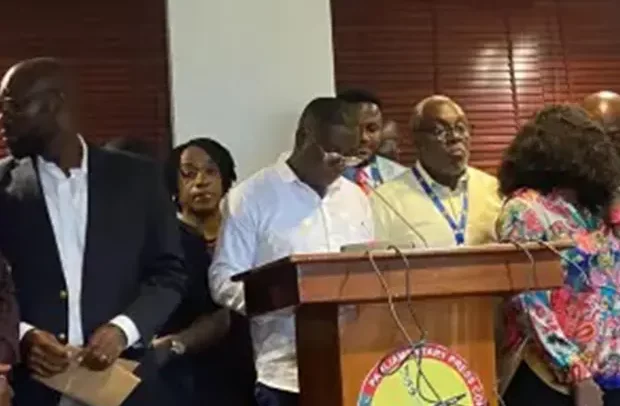The Minority in Parliament has expressed concern over John Abdulai Jinapor, the Energy Minister Designate’s responses during his vetting, highlighting several inconsistencies and troubling statements.
According to the New Patriotic Party (NPP) Minority, the nominee, who previously criticized the Gold for Oil policy, remained unrepentant when questioned about his past remarks, describing the initiative as a “scam.”
Despite stating that he would review the policy, the Minority raised concerns over how one can review a policy he has already labeled as fraudulent.
The Minority further questioned the nominee’s accountability, particularly his failure to offer concrete solutions to the ongoing challenge of securing foreign exchange for petroleum imports, a matter that has a direct impact on fuel pricing and, ultimately, the Ghanaians.
“We face significant increases in petroleum prices, which will burden ordinary citizens with higher fuel costs,” the Minority spokesperson, Gideon Boako stated.
Fuel Supply and Misleading Statements
The nominee’s earlier claims regarding the country’s fuel reserves also came under scrutiny.
He had previously alarmed the public by stating that Ghana had only five hours of fuel supply left, warning that the country could run out of fuel in two days.
However, when pressed for clarification, he shifted his narrative, explaining that his warning referred only to Heavy Fuel Oil (HFO) for AKSA and light crude oil for Sunon Asogli.
The Minority found this clarification misleading, pointing out that other Independent Power Producers (IPPs), such as CenPower, had sufficient light crude oil reserves to last for 23 days.
Additionally, they noted that fuel procurement for IPPs is an ongoing process, contradicting the nominee’s claims of an impending crisis.
“It has been more than two days since his warning, and the lights are still on. Why is the country not facing a blackout?” the Minority asked.
Private Sector Participation
Another point of contention was the alleged nominee’s shifting stance on private sector participation in the Electricity Company of Ghana (ECG).
Initially, on September 18, 2024, the Minority said Mr. Jinapor criticized private sector involvement, arguing it would exacerbate political interference.
However, by January 7, 2025, he allegedly had reversed his position, advocating for private-sector participation in metering and collection.
The Minority questioned the nominee’s credibility, pointing to the inconsistencies in his statements.
“Does the nominee want to introduce ‘GORO BOYS’ into ECG activities?” they asked, urging the public to reflect deeply on the implications of such contradictory positions.
Accountability
The Minority emphasized the importance of the Energy Minister’s role for Ghana’s future, urging the nominee to demonstrate accountability, transparency, and a commitment to the welfare of all citizens.
“We must not overlook the substance of these answers as we consider the path forward for our energy sector,” they said.
By Ernest Kofi Adu, Parliament House


